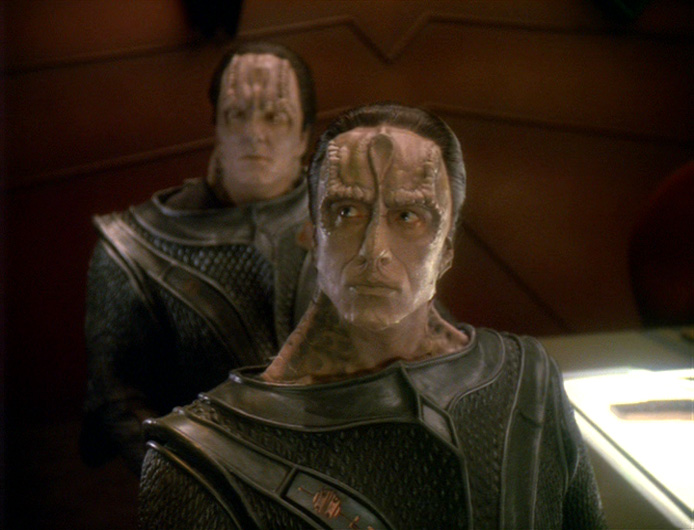^ Anytime.

But Sisko would still have been responsible for enabling Garak's misdeeds in such a scenario.
Anyway, Green's main point, IMO, is the choice is an easy one. For good or for ill, a wartime ship/station CO shouldn't hesitate to potentially sacrifice three or four foreign civilians to save millions of his own. In light of Sisko's histrionic agonizing, "ItPM" isn't nearly as mature as many make it out to be. One could very well argue that it's in fact far more
naive about humanity than just about any non-
DS9 ep.
historically, you could argue that during major wars just about every democracy has done far worse things than what Sisko did in ITPM.
Just to give U.S. examples: suspension of habeas corpus, jailing those who spoke out against a war or sought to avoid conscription, conscription itself, jailing American citizens of Japanese dissent, etc. etc.
The episode does not address raison d'état in and of itself: the Federation's involvement in the fabrication is not really explored, and indeed, we are told that Starfleet approved of the plan in general. What the episode deals with is the relationship between raison d'état and civil ethics. This is a particularly messy topic when dealing with democratic societies, and even though a list of antidemocratic policies can be made, it can equally be said that the public could react negatively to them. Over the last thirteen years, things like the invasion of Iraq, the use of drones, and surveillance of personal communications have been questioned by the public in terms of whether the imperatives of war justifies them. There is potential for the pendulum to swing both ways, accepting something because of war one moment, criticizing the behavior of the government in another.
Ms. Green greatly mischaracterizes Garak. Is he amoral? That's an exaggeration. Whereas he would complete the assignments given to him--to do his duty--he is not generally violent, nor does he relish in inflicting violence, nor does he find opportunities to take advantage of people. He is professional: he is precise, and he is proud of being able to produce a specific effect. He never kills or tortures out of pleasure. Indeed, the one time he would seem to step outside his professionalism, when he interrogates Odo, he takes no pleasure. It is impossible to believe that he would not carefully measure his actions and their potential results. How far would he go to bring the Romulans into the war? Green doesn't give a counterexample of something believable. Would he poison a Romulan colony and plant evidence? That would be unbelievable. He is not that random or messy in his work. Moreover, his "betrayal" is really only effective because, as Garak puts it, it is something Sisko would have wanted to do. Sisko does not contradict what he says here: he was disarmed by it. If Garak had done something more outrageous, he could not in that moment implicate Sisko in the same way.




